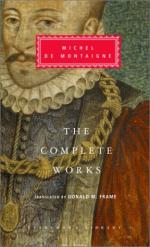
|
| Name: _________________________ | Period: ___________________ |
This test consists of 5 short answer questions, 10 short essay questions, and 1 (of 3) essay topics.
Short Answer Questions
1. What advantage does Montaigne say that women have in entering into marriage?
2. Montaigne's model for the rhetoric in his work is best described as what?
3. The unfinished church that Montaigne visits is to be called what?
4. In Travel Journal: Chapter 13, Montaigne describes a priest who speaks what out-of-place language as part of his services?
5. What scholar is quoted in the opening of Book 2 of Essays: Essay #1?
Short Essay Questions
1. What are Montaigne's influences in his "Apology to Raymond Sebond"?
2. What did the notorious criminal Catena once force two men to do before he killed them?
3. What influences may have caused Montaigne to have a greater respect for women?
4. Describe the culture of public bathing that is discussed in Montaigne's journal.
5. What does Montaigne admit about himself?
6. What qualities interest Montaigne about public water?
7. Why did Montaigne write his travel journals?
8. What does Montaigne say about truth?
9. What was Montaigne's general attitude towards women?
10. What does Montaigne say about the differences in the desires of men and women?
Essay Topics
Write an essay for ONE of the following topics:
Essay Topic 1
In one of his essays, Montaigne discusses the act of using evil means to achieve goods ends. His opinion on this subject is nuanced and impartial.
1) Discuss, using Montaigne's examples, the major philosophical points that come into play when discussing the justification of evil means for achieving good ends.
2) Summarize Montaigne's opinion on the subject, discussing whether or not justifications can be made in certain circumstances, and what moral weight these types of actions carry.
3) Analyze Montaigne's other writings and journals and asses whether or not Montaigne appears to be consistent in his own life n the application of the recommendations he makes in his essay about using evil means for good ends. Does he sometimes break his own rules, or does he generally adhere to them?
Essay Topic 2
Montaigne believes solitude to be exceedingly important in the pursuit of honestly and unfiltered self-analysis, a goal he regards as being objectively desirable. He claims that one's thought and words are affected by others, even if only out of politeness and sociability, and that this filtering acts to hinder proper, honest thought.
1) Explain why Montaigne believes that achieving honest self-analysis is a desirable goal. Discuss some of the prerequisites that Montaigne sees as being necessary for achieving this goal.
2) Discuss the effect that Montaigne believes other people have on an individual's thought processes. Is this reaction essential good or bad? Is it dishonest or sincere?
3) Describe the importance that Montaigne places on solitude, and what he believes people should do to benefit most from the experience of solitude. How does this belief tie into his assertion about self-analysis?
Essay Topic 3
The subject of repentance is central to Montaigne's religion, and he expresses sincere and powerful opinions on the subject, making clear distinctions about what can be repented for, and how this act can be cathartic or destructive.
1) Discuss what repentance means to Montaigne, why it is important to a healthy spiritual life, and how its misuse can be harmful.
2) Describe the limits and rules that Montaigne recommends for repentance. What type of acts does he say cannot be repented of?
3) Discuss Montaigne's assessment of the importance of repentance in Christianity and in Catholicism specifically. Explain how these ideas relate to Montaigne's own opinions.
|
This section contains 838 words (approx. 3 pages at 300 words per page) |

|




